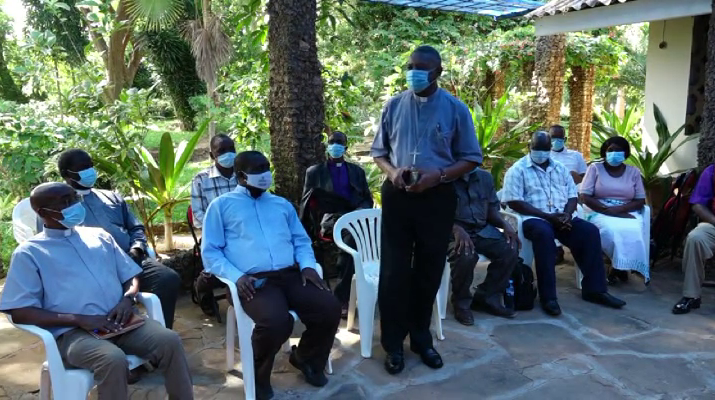Clerics from Kilifi county have made a passionate appeal to the government to include religious leaders as essential services to enable them deliver their duties effectively during this period of Covid-9 pandemic.
Led by Malindi Catholic bishop Willybard Lagho the clerics said it was unfortunate that they were left out of the list of essentials service providers yet they play a key role in society.
Addressing journalists after hosting Senior Christian Clerics for the first Interdenominational breakfast meeting at his residence in Malindi Lagho called on the government and the Ministry of Health to include the church and religion as an essential service.
He said they are ready for any talks with the government anytime so as to ensure they discuss the critical issue of listing them as essential services.
“The essential nature of a human being recognizes the existence of God and even the preamble of our constitution recognizes the powers of God and the nation is under the almighty,” he said.
The bishop wondered why on the issues of Covid-19 many departments such as security, doctors, and even transport have been listed as essential services but a religion which is the backbone of human beings were left out.
“We urge the government to think about this issue seriously because had religious leaders left the government to deal with the pandemic alone it could have been difficult, that’s why the government called leaders of Interfaith and gave us the responsibility of sensitization because we have a readymade audience” he said.
He said their audience is voluntary and is met at least once in a week as opposed to the other audience that at times have to be bribed to attend meetings.
The Bishop said failing to list religion and its leaders in the essential services the government is missing a very big player.
Lagho also said there was a need for the government to begin an aggressive sensitization against the Covid-19 pandemic particularly in the grassroots.
He said a majority of those living in the rural areas do not follow the Covid-19 protocols which contribute to the increase in the spread of the virus.
“Sensitization is very low and the level of illiteracy also contribute because when you go to town many people are able to follow news on television, radio or read newspapers and even international news which makes them well versed with what is happening but as soon as you leave town very few do-follow up such issues,” he said.
Bishop Amos Lewa the Secretary Coast Interfaith Council of Clerics on his part said the government should list them as essentials because they work for 24 hours daily.
He said currently there are many challenges caused by the Covid 19 pandemic including family conflicts and depression due to loss of jobs and harsh economic times.
Lewa said just the other day he had to travel during curfew hours to resolve a family conflict that was 40 kilometers away.
“I came back home at 11 pm I had gone to resolve a serious family conflict between a father and a mother who wanted to kill each other and I was called urgently, we had long talked until they cooled down,” he said.
Lewa said such cases are rampant among families people are killing each other or injure one another and as religious leaders, they have a hard task to broker peace.
The Bishop said he was lucky to have the essential service but it could have been difficult to respond to such an emergency which could have had serious repercussions among those involved.
He said families have many challenges now following the effects of the pandemic that has led to massive job losses leading to depression and stress.

